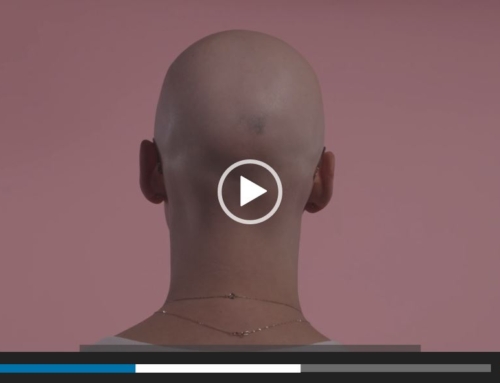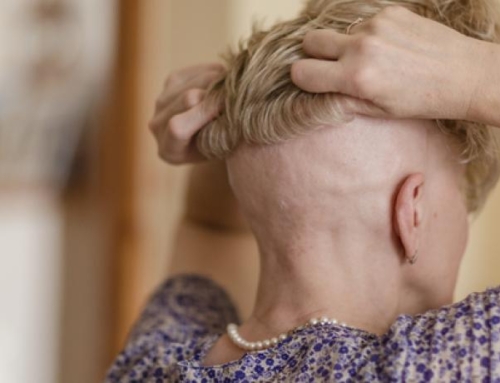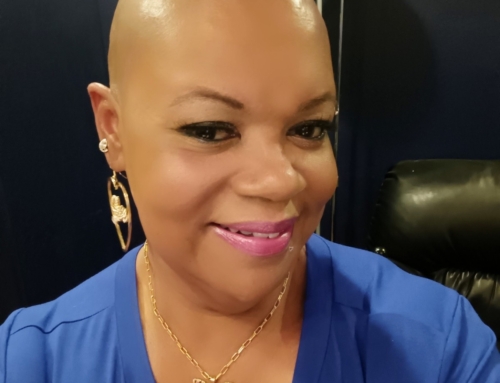We often think of living with Alopecia Areata as a rollercoaster: There’s ups and downs and sometimes what feels like never-ending loops of hair loss and regrowth. All in all, it is a mentally and emotionally challenging disease to navigate alone. Knowing where to go when you need a helping hand can make a big difference to your happiness and quality of life.
Living with Alopecia Areata
Alopecia Areata may place a significant burden on you and change the way you enjoy your everyday. Because you can develop Alopecia Areata at any stage of your life, how you are affected by hair loss may be different from someone else. If you have been diagnosed with Alopecia Areata, you may:
- Develop low self-esteem or self-confidence
- Experience sadness or cry a lot due to the grief of your hair loss
- Fear school, work, social events, or regular activities that you once enjoyed
- Feel anxious or ashamed around friends and family
- Go through bouts of depression in connection with new hair loss
- Struggle to identify with yourself or feel like a different person
- Avoid looking in the mirror
These are just some of the impacts on mental health which can be serious. Often a mental health professional is key part of navigating the alopecia journey, just as your doctor and dermatologist are. While a dermatologist can help by treating the physical symptoms of Alopecia Areata, a therapist can help you navigate the mental challenges so you can still live a fulfilling life.
To help you find the right supports, Registered Social Worker Alison Collison (MSW, RSW) gives us an overview of the different kinds of mental health professionals you can visit and which are more suitable for someone living with Alopecia Areata. She also provides a list of starting points for mental health support in the Greater Toronto Area (GTA).
Newly Diganosed with Alopecia Areata? Here are five steps to take.
Read HereWhat is a Psychotherapist?
The term “therapist” is used to describe many different professionals of varying backgrounds and experience. In this way, a therapist is an umbrella term that describes professionals who provide treatment and rehabilitation. When someone speaks of their “therapist”, they could be referring to a mental and emotional health therapist (psychotherapist), a physical health therapist (physiotherapist), a marriage therapist, and so on.
According to Social Worker Alison Collison, “Psychotherapists hold specific training in psychotherapy. They may have undergraduate or graduate degrees in addition to this, but it is not required to become a psychotherapist. In their training, Psychotherapists learn a number of theoretical models and can specialize in certain areas of mental health.”
3 Types of Psychotherapists
Below Alison breaks down three main types of psychotherapists: Psychiatrists, Psychologists, and Social Workers. Each are distinct from one another in how they offer mental health support.
Psychiatrist
Psychiatrists are medical doctors that specialize in mental health. Along with diagnosing mental health disorders, they are responsible for prescribing medication that may be helpful. Therapeutic support can also be given, but they usually do not provide in-depth therapy. Psychiatrists are covered through the provincial health care systems in Ontario (OHIP), Alberta (AHCIP), and British Columbia (MSP).
Psychologist
Psychologists, like psychiatrists, are doctors but have a PhD in Psychology. They diagnose mental health disorders and provide short-term or long-term therapeutic support. They often have an area of specialty in their work and complete in-depth assessments of clients. One such assessment is the psychoeducational assessment, which is used to identify if you have anxiety, depression, ADHD, autism, or a learning disability.
You can connect with a Psychologist both through the public sector (hospitals, schools, treatment centres etc.) and the private sector. If you seek a Psychologist in the private sector, you will be required to pay for their services unless you have private insurance coverage or employee benefits.
Social Worker
Social Workers hold a master’s degree or a PhD in Social Work and are trained to assess and treat mental health concerns using various theoretical models. Like Psychologists, they work in the public sector (hospitals, schools, treatment centres) and also work privately. Social workers tend to specialize in certain areas of mental health such as anxiety, depression, other mental health disorders, significant life events, and long term conditions.
Which mental health professional is best for someone living with Alopecia Areata?
To find mental health support for your alopecia, Alison tells us either a Psychologist or a Social Worker would both be appropriate options. Most people who have alopecia are dealing with loss, anxiety and trauma. Both Psychologists and Social Workers are trained to manage these impacts. Psychologists are generally more expensive which may factor in when choosing who to contact.
Mental health resources in the Greater Toronto Area (GTA)
Mental Health support in Ontario is both publicly available and privately available (you pay directly for the service). Below are some agencies in the GTA who support adults, youth, and children with their mental health. When you or a family member is diagnosed with Alopecia, you may feel additional support would be helpful therefore it is best to talk to your Family Doctor for recommendations for support in your specific area. He/She/They will be able to guide you to local support that is available. Hospitals also have mental health departments and can be accessed through a referral from your Family Doctor.
The following links are public (no fee) centers for your information. They are not the only centers in Toronto but can be used as a starting point.
Adults
- Find mental health support | ontario.ca
- Mental Health Resources – City of Toronto
- CMHA-Toronto-Programs-and-Services-Brochure-2020-online.pdf
- What is mental health? – Kids Help Phone
- Adult mental health centres toronto – Search (bing.com)
- Find the Best Therapists and Psychologists in Ontario – Psychology Today -these are Therapists who you would pay directly
Children & Youth
- Mental Health for Children and Youth – Toronto – torontocentralhealthline.ca
- Home – Children’s Mental Health Ontario (cmho.org)
- Community & Specialized Mental Health Services for Children and Youth | Michael Garron Hospital, Toronto East Health Network (MGH/TEHN)
- Youth Zone (cmha.ca)
- Homepage – Strides Toronto
- Home | George Hull Centre for Children and Families
Mental health resources in Durham/Peel
Mental Health support in Ontario, is both publicly available and privately available (you pay directly for the service). Please refer to the information regarding Mental Health Clinicians to help guide you.
Below are some agencies in the Durham/Peel area who support adults, youth & children with their mental health. When you or a family member is diagnosed with Alopecia, you may feel additional support would be helpful therefore it is best to talk to your Family Doctor for recommendations for support in your specific area. He/She/They will be able to guide you to local support that is available. Hospitals also have mental health depts and can be accessed through a referral from your Family Doctor.
The following links are public (no fee) centers for your information. They are not the only centers in Durham/Peel but can be used as a starting point.
Adults
- 211 Central
- Mental Health Resources – Region of Durham
- CMHA Peel Dufferin (24/7 Crisis Lines: 905-278-9036 or 1-888-811-2222)
- Caledon\Dufferin Victim Services
- Find the Best Therapists and Psychologists in Ontario – Psychology Today -these are Therapists who you would pay directly
Children & Youth
Know who to contact
Mental health support is an essential part of the alopecia journey. If you are unsure where to begin, contact your Family Doctor for assistance and use the resources above if you live in the GTA. Remember that family, friends, and CANAAF are here to help- you do not have to live with alopecia in silence.
January 25th, 2023: Bell Let’s Talk Day
Every year in January, Bell Canada holds Bell Let’s Talk Day in support of Mental Health awareness. By taking action today, and everyday, we can help ensure that everyone struggling has access to mental health support. Join the fight and learn what you can do to create positive change by visiting letstalk.bell.ca.





